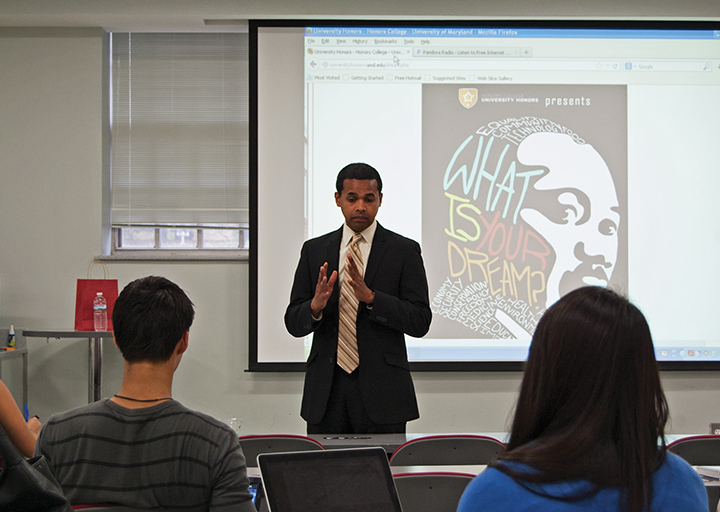
Students listen to Paul Monteiro, Public Engagement Advisor in the White House, speak at a What is Your Dream? event in La Plata Hall.
Shortly after President Obama took office nearly five years ago, his administration launched what is now known as the White House Office of Public Engagement as part of an effort, the president said, to create “an unprecedented level of openness in government,” a task Paul Monteiro has taken to heart.
Monteiro, a Columbia native and 2002 university alumnus, works as an adviser in the office, where he engages the administration and the public in discussion focusing on Arab-Americans, gun violence, faith and poverty.
Monteiro, 32, came to the university after graduating from High Point High School in 1998. Since then, he’s worked as an intern for the Supreme Court and White House, a congressional aide for then-Sen. Obama and a corporate lawyer.
Yesterday evening, Monteiro returned to the campus, speaking to a small crowd of students in La Plata Hall’s Multipurpose Room about his entrance into and experiences working in law and national politics.
As a student on the campus, Monteiro was involved in the Student Legal Aid Office, Student Government Association, academic quiz team and two different fraternities. After he graduated with a history degree, Monteiro attended Howard University’s law school, and from there, he took a job in the Washington office of Los Angeles-based law firm O’Melveny & Myers LLP.
He was on track to live a comfortable private-sector life, but Monteiro said something changed in summer 2006.
“I met this guy, Barack Obama,” he said. Obama was participating in a town hall with Tim Russert at the Warner Theatre in Washington. The theme of the discussion, according to a press release, was “making a difference through public service.”
Monteiro, only a few years out of college, found himself wowed by the junior Illinois senator’s responses in his talk with Russert, NBC’s longtime Meet the Press host.
“He was just so thoughtful,” Monteiro said.
Monteiro was instantly struck. Several months later, he left his job as a corporate attorney and landed a position in Obama’s Capitol Hill office, working on faith outreach issues. Obama was just one senator of 100 at the time, not nearly the political celebrity he would become during his campaign for president in 2008.
“Getting to meet him in that window of time was really a blessing for me,” Monteiro said.
He worked on Obama’s 2008 campaign as deputy director of religious affairs, and after the candidate’s victory, he took a job on Obama’s inaugural committee, then a job in the administration that he still holds.
In a question-and-answer session with students, Monteiro offered advice on getting into the highly competitive, high-pressure world of professional politics.
“Nothing’s private, even if it’s set as private,” he said, warning the audience that high political figures’ staffers and interns fall under a sharp social media microscope.
“You can be straight ‘As,’ great degree, all the right experience, but if you want to work in politics, you always have to look at things through The Washington Post test,” he said. “How would this look if it were on the front page of The Washington Post?”
He also stressed the importance of taking advantage of the university’s close proximity to the nation’s capital and all institutions and opportunities that come with it.
“You’re literally and figuratively right next door to the U.S. government,” he said.
The discussion, part of the University Honors Program’s “What is Your Dream?” programming series, had an audience of about a dozen, and organizers said they were pleased with how the event went.
Cathy Barks, associate director of the honors program, said Monteiro “didn’t start out with connections,” but with “a very small dream,” making his a good example to follow.
Damien Franze, University Honors program coordinator and the event’s organizer, was also pleased.
“I thought it was great,” he said. “I think Paul is really engaging, and the fact that he’s an alum, I think, makes him so relatable to all the students that were in the room to see, ‘That could be me.’”



